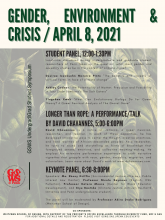“The environment,” Stacey Alaimo argues, “is not located somewhere out there, but is always the very substance of ourselves.” The environment is materially inextricable from human bodies. But as climate crisis changes environments, climate-related events transform what bodies are. Furthermore, in the context of climate change, environmental risk and harm are unevenly conditioned by racial, class, and gender bias. As Laura Pulido argues, “racism is a process that shapes places.” Racial and gender bias not only affect the distribution of climate-related risk and harm, they also impede coalition building in the pursuit of climate justice. As Ayana Elizabeth Johnson argues, “racism derails our efforts to save the planet.” In the context of climate change, how the environment shapes bodies is always in conversation with systems of racialized and gendered power that determine the uneven contours of climate crisis as it structures and becomes everyday life.
Feminist engagements with geography, science and technology studies, ecocriticism, queer and trans theory, Indigenous studies, and critical race studies have argued for a reconceptualization of how social, cultural, and material systems constitute one another. Working toward environmental justice requires changing how we describe human-nonhuman relations, and also how we produce, manage, extract, maintain, repair, and use built and nonhuman resources and environments. At the same time, climate crisis changes what constitutes human-nonhuman relations, and what it means to advocate for justice on and between the grounds of race, gender, sexuality, and disability.
Part of a day-long symposium on the topic "Gender, Environment, and Crisis," this lunchtime discussion among undergraduate and graduate student researchers at Penn takes up the question: what must gender and sexuality studies be in the context of climate crisis?
Presenters:
Desiree Izecksohn Moreira Pinto
Title: "The benefits and caveats of vertical farms in face of climate change"
Bio: Desiree is a student at the University of Pennsylvania pursuing an undergraduate and a master's degree in Environmental Studies with a minor in Design. She is the founder and president of Penn Sustainability Consulting, a student club that is committed to providing sustainability consulting services and solutions to local organizations. She is passionate about achieving a circular economy that not only stays within the planetary boundaries but also promotes social wellbeing.
Ashley Codner
Title: “The Potentiality of Matter: Precipice and Possibility in Toni Cade Bambara’s The Salt Eaters.”
Bio: Ashley Codner is a senior in The College of Arts & Sciences majoring in English with minors in Consumer Psychology and Jazz & Popular Music Studies. Her work exists in the interstices of Black literature, feminism, and sound studies. As a Mellon Mays Undergraduate Fellow, she has examined the link between Black artistic production and lived experience by studying ways Black authors incorporate musical forms and motifs into their writing, the culmination of which is her senior honors thesis, “Caught In/Between: Expressions of Liminality in Jazz Aesthetic Literature. In it, she explores how Black women in the post-Black Liberation era use jazz and liminality to make sense of their present and forecast an idealized future of personal and communal healing. She hopes to continue her studies in graduate school and enter academia with the goal of centering and uplifting Black voices.
Yingchen Kwok
Title: "What Can Evolutionary Biology Do for Queer Theory? A Queer Feminist Analysis of The Genial Gene"
Bio: Yingchen is a 2nd year Ph.D. student at the Department of History and Sociology of Science. Her research incorporates queer, trans, and feminist theoretical perspectives in the history of evolutionary biology, focusing in particular on how concerns of political, social, economic, and psychic reproduction shape biological knowledge of sexual and asexual reproductions from the late 19th Century until the present.

 The Program in Gender, Sexuality, and Women’s Studies
The Program in Gender, Sexuality, and Women’s Studies